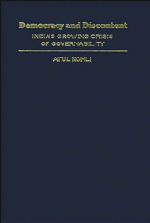Book contents
- Frontmatter
- Contents
- List of tables and figures
- Preface and acknowledgments
- PART I INTRODUCTION
- 1 An overview of the study
- 2 Some conceptual and theoretical considerations
- PART II THE GROWING PROBLEMS OF GOVERNING THE PERIPHERY: POLITICS IN THE DISTRICTS
- PART III ORDER AND BREAKDOWN IN THE STATES
- PART IV CENTRALIZATION AND POWERLESSNESS AT THE CENTER
- PART V FINAL INFERENCES
- Bibliography
- Index
2 - Some conceptual and theoretical considerations
Published online by Cambridge University Press: 05 June 2012
- Frontmatter
- Contents
- List of tables and figures
- Preface and acknowledgments
- PART I INTRODUCTION
- 1 An overview of the study
- 2 Some conceptual and theoretical considerations
- PART II THE GROWING PROBLEMS OF GOVERNING THE PERIPHERY: POLITICS IN THE DISTRICTS
- PART III ORDER AND BREAKDOWN IN THE STATES
- PART IV CENTRALIZATION AND POWERLESSNESS AT THE CENTER
- PART V FINAL INFERENCES
- Bibliography
- Index
Summary
The purpose of this study is to describe and to explain India's growing crisis of governability. The study's argument is derived primarily from empirical materials. Because any such empirical analysis must begin by defining concepts and specifying the a priori theoretical inclinations, this chapter will define some core concepts of this analysis and outline the state–society orientation that underlies the study. It is argued that many of the explanations commonly offered for “crises of governability” in developing countries, both developmental and Marxist, are too societycentered. In a country in which the state sets the agenda for socioeconomic change and in which extensive state intervention is an integral part of the changing political economy, understanding the nature and role of the state is crucial for the analysis of patterns of political change. This emphasis ought not to lead to an a priori neglect of socioeconomic forces. Rather, it means that both state and societal forces need to be taken into account. Therefore, the theoretical stance that informs this study continually emphasizes the interactions of political and socioeconomic variables.
SOME CONCEPTS DEFINED
The concept of “crisis” used in this study is not intended to imply that a breakdown of political order is imminent. It is, instead, used in its more limited and literal sense. Webster's Third New International Dictionary offers several definitions of the term “crisis,” among them the following: (1) “the point of time when it is decided whether an affair or course of action shall proceed, be modified, or terminate,” (2) “decisive moment,” (3) “turning point.”
- Type
- Chapter
- Information
- Democracy and DiscontentIndia's Growing Crisis of Governability, pp. 22 - 32Publisher: Cambridge University PressPrint publication year: 1991



